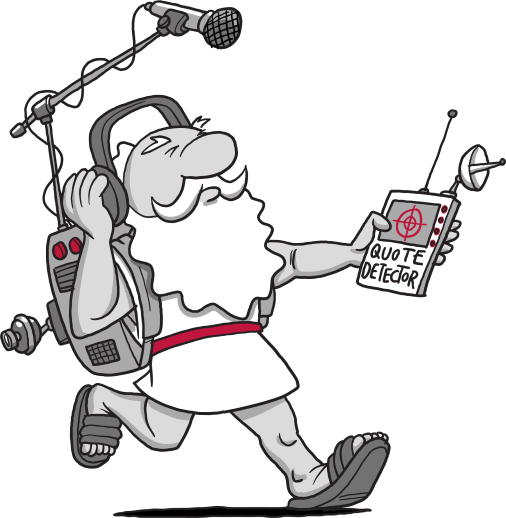
This is a shortened excerpt from my forthcoming book about how to improve messaging in and around the EU. The case study is from China but it could equally have been from any country in Europe.
What is quote anxiety?
It’s been a while since I’ve encountered and had to manage what I call ‘quote anxiety’ in a media training.
Quote anxiety occurs when experts know they want to use the media to build profile and influence for themselves and their organisation. However, they are initially uncomfortable and nervous about the process of developing and delivering good quotes.
Here’s a case study from a recent training with a group of thinktank experts, in which I showed them this quote (that I liked) from the Financial Times. It was from a story about how China plans to exit its Covid restrictions.

This was the reaction from two of the experts:
Expert 1: ‘I would feel really stupid saying this. If I read that quote in the FT or Bloomberg, I would think it was stating the obvious, and that any China expert could have said it’.
Expert 2: ‘Isn’t the question more, why AREN’T we saying it? Why isn’t the FT coming to US for the quotes and going to Chen Long instead?’
Expert 1 has a classic case of quote anxiety. Before getting into the reasons why experts get anxious, it’s worth going over what makes a good media quote and why Chen Long’s worked as well as it did.
What makes a good quote?
Some key features of quotes include:
- Short i.e., no more than two sentences.
- Colloquial i.e., it uses words than an intelligent 10-year-old can understand. Sometimes they contain a flash of wit or a metaphor.
- Jargon free. This includes corporate speak, not just technical terminology.
- Chen Long’s quote from the FT case study not only ticked all those boxes but was strong enough to influence the headline and angle. This is about as good as it gets for an interviewee in this kind of article.
Why do journalists need experts to speak in quotes?
From the journalist’s perspective, a quote provides the third-party corroboration for the story they are working on. Sometimes (but not always), they already know their angle and are looking for what is known as a confirmatory quote.
Journalists want to feature experts in their stories because, der, they are experts who can add new insight and deep knowledge on a topic for the journalist’s audience.
But they need them to be able to speak or write in quotes, otherwise the journalist cannot use their raw contribution. This is one of the reasons why they often discard or rewrite very long, technical or just plain woolly quotes into something that they can use.
And if there’s one thing that experts hate, it’s having their carefully worded opinions rewritten and (at least in their minds) dumbed down into a quote.
Why do experts get anxious about quotes?
There are three reasons:
- They are worried about being misquoted, or having their words taken out of context and misinterpreted.
- They think it’s somehow beneath them because they think their peers i.e. small handful of experts in their field, will look down on them if they express an opinion clearly and simply and don’t include all the details.
- They are perfectionists who want to nail the quote first time and get stressed when they can’t.
The first and third concerns are easily dealt with. The best way to avoid being misquoted or being quoted out of context is simply not to give journalists long, rambling ambiguous quotes that they can edit selectively.
Instead, create your own punchy, summarising quote in advance and use it. Don’t wait for perfection. Get the idea down first and THEN refine it into a form you are happy with.
As for the second point: the experts are, of course forgetting that the media is their gateway to a wider audience that isn’t nearly as specialised as them. What may feel like something obvious to the expert almost certainly won’t be to a wider audience.
Or, to put it another way, the journalist is not writing exclusively for the handful of other experts who know as much as the interviewee.
What can PRs do to help?
PRs can help reduce quote anxiety by helping experts understand that talking to/writing for the media represents a snapshot, not the sum total of their knowledge.
It is simply one way of building their profile and enlarging the audience for their ideas by re- packaging of expertise in a media friendly form.
Or, to put it another way, overcoming quote anxiety involves viewing quotes for what they are: a gift for journalists, who will happily use them to show you’re an expert for whom clarity is key.
